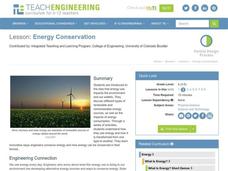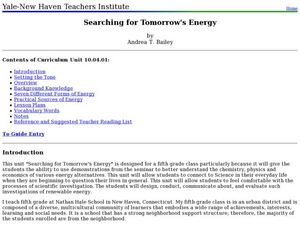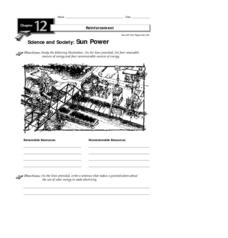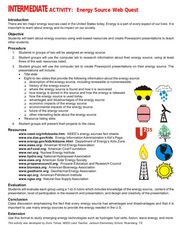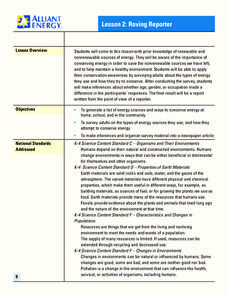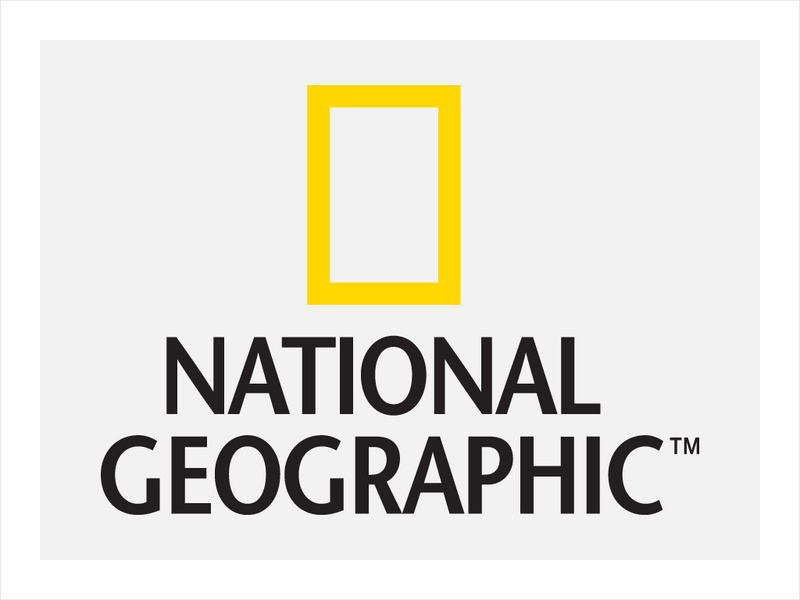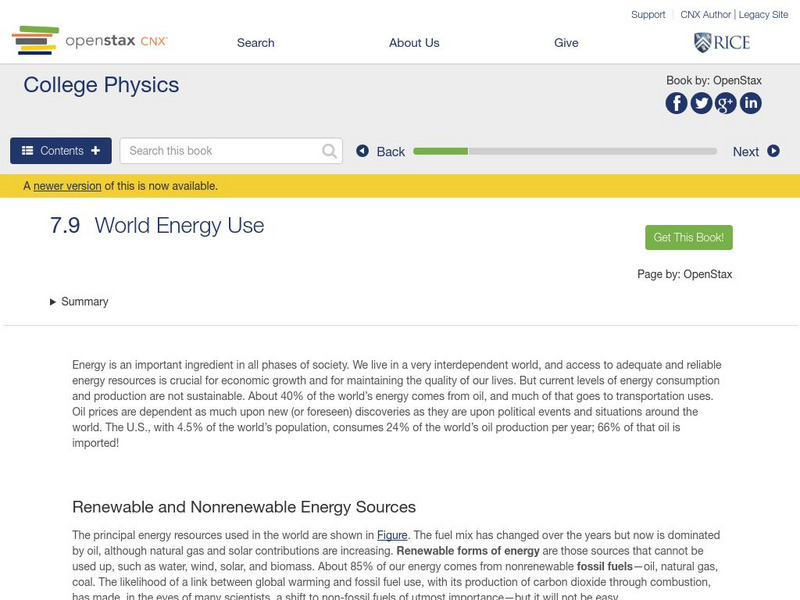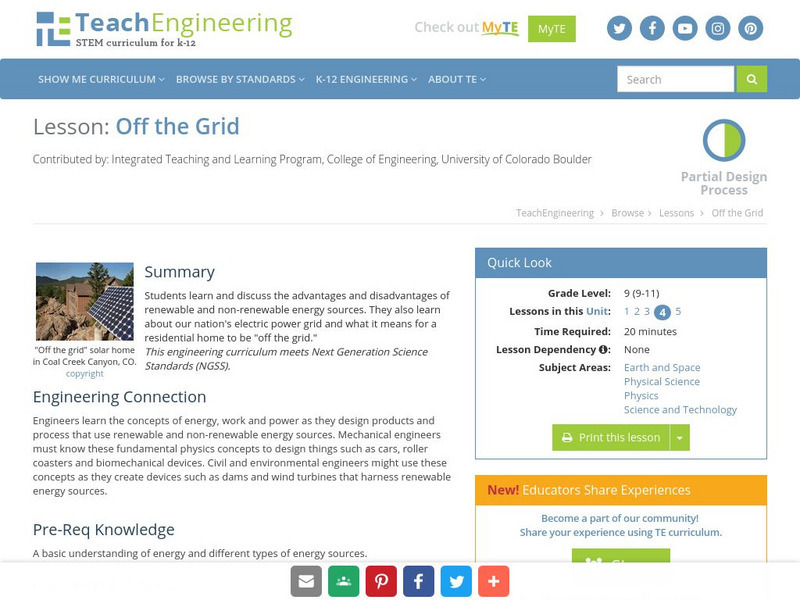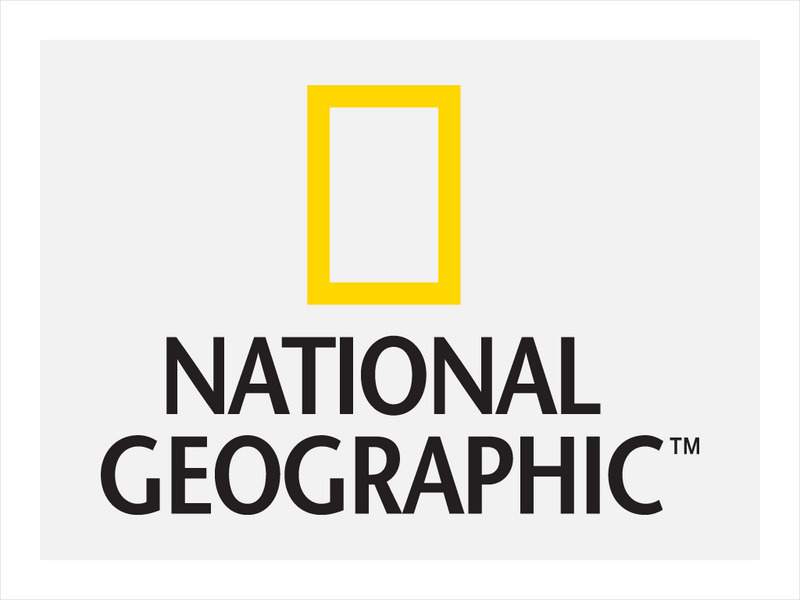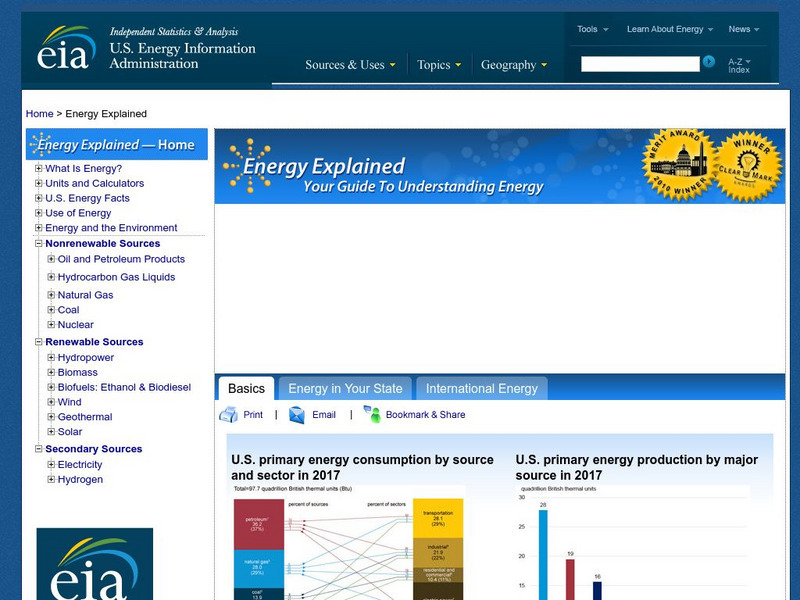Curated OER
Energy Conservation
Students investigate energy conservation. In this energy conservation and analyzing data lesson, students identify and explain several energy sources and research renewable and nonrenewable energy sources. Students use statistics...
Curated OER
Renewable Energy Sentences
Students construct sentences using nouns and verbs from a "renewable energy" word bank. In this cross curriculum ecology and sentence structure grammar and mechanics lesson, students listen to the book Our Earth: Clean Energy by Peggy...
Curated OER
Sources of Energy
Seven slides simplify sources of energy for your upper elementary science superstars. This concise presentation defines energy, lists forms of energy, and then compares renewable to nonrenewable sources. Have viewers take notes, and then...
Curated OER
Searching for Tomorrow's Energy
Fifth graders investigate energy. In this biology lesson plan, 5th graders will learn about energy, fossil fuels, and renewable and nonrenewable resources. Students will be participating in three lab activities which are described in...
Curated OER
Sun Power
In this energy worksheet, students study an illustration to identify 4 renewable and 4 nonrenewable sources of energy. This worksheet has 9 short answer questions.
Curated OER
Energy Source Web Quest
Learners research an energy source and create a Power Point presentation to share with the class. In this energy sources instructional activity, students are assigned an energy source to research. They use the Internet to research the...
Curated OER
Roving Reporter
Students write a report about energy use. In this conservation lesson, students interview adults about their use of renewable and nonrenewable energy. Students synthesize this information and write a report from the point of view of a...
Curated OER
20 Questions Energy Sources Scavenger Hunt for Energy Kids
In these scavenger hunt worksheets, students go to the 'Energy Facts' section of the Energy Information Administration Kids' Page web site. Students read through the different energy forms for renewable and nonrenewable energy. Students...
Curated OER
Energy: Exploring Alternative Forms
In the study of science, there is always
going to be research, data, theories and wonderful new discoveries. I feel that my interest
about energy will help me design an adequate unit full of intrigue and discovery. The
pupils should also...
Curated OER
Home Energy Audit: Electrical Production Worksheet
In this energy production activity, students describe the difference between renewable and nonrenewable energy and identify the different types of energy. This activity has 1 short answer, 1 matching, and 1 problem to solve.
Geographypods
Geographypods: Patterns and Change: Patterns in Resource Consumption
This collection of three learning modules looks at issues related to resource consumption. It examines theories about how population size affects consumption, the changing patterns of energy consumption, and ways to minimize consumption....
Canada Science and Technology Museum
Canada Science and Technology Museum: Background Information for Energy
Energy! What do you know about it? Use this terrific site to find out everything about it through a series of Q&As. Educators will find useful lesson plans at the related Teacher's site.
National Geographic
National Geographic: Non Renewable Energy Resources
This lesson is a simulation that has students looking at consumer, municipal, and corporate perspectives towards nonrenewable energy resources. Includes student handouts.
OpenStax
Open Stax: World Energy Use
From a chapter on work and energy in a Physics textbook. This section of the chapter covers the difference between renewable and nonrenewable energy resources, the growth in the world's energy consumption, and the link between energy use...
TeachEngineering
Teach Engineering: Off the Grid
Students learn and discuss the advantages and disadvantages of renewable and non-renewable energy sources. They also learn about our nation's electric power grid and what it means for a residential home to be "off the grid."
US Energy Information Administration
U.s. Eia Energy Kids: Coal
Easy-to-understand information on mining and transporting coal, producing it, uses of coal, and coal and the environment.
National Geographic
National Geographic: Encyclopedic Entry: Non Renewable Energy
A good primer on non-renewable energy sources. Covers the overall advantages and disadvantages, and discusses the different types and their pros and cons. Includes a slideshow with captions.
National Geographic
National Geographic: Evaluating Other Energy Sources
A comprehensive lesson where learners examine the different costs and benefits associated with renewable and nonrenewable sources of electricity. Includes a 22-question interactive module where they look at real-world data and images...
Other
California Energy Commission: Games: Watt's That?! Jr.
This site from California Energy Commission provides six different games about energy in which you may play by yourself or against an opponent to answer trivia questions.
E-learning for Kids
E Learning for Kids: Science: Cayman Islands: What Is Energy Conservation?
Renewable and nonrenewable energy sources are described, different types of energy, and how energy can be conserved.
US Energy Information Administration
U.s. Eia Energy Kids: Energy Basics
Learn about the definition of energy, the forms that it comes in, and the difference between renewable and nonrenewable sources.
US Energy Information Administration
U.s. Eia Energy Kids: Energy Explained
A comprehensive source of information about energy in all its forms. Each type of energy is explained, along with information about its environmental impact, supported with graphs, charts, and other data. There is a twenty-question quiz...
Science Struck
Science Struck: Advantages and Disadvantages of Nuclear Energy
Discusses the pros and cons of nuclear energy.
CK-12 Foundation
Ck 12: Earth Science: Renewable vs. Non Renewable Energy Resources Study Guide
[Free Registration/Login may be required to access all resource tools.] Summarizes the key points about renewable and nonrenewable resources. Includes a few questions to check for understanding.


